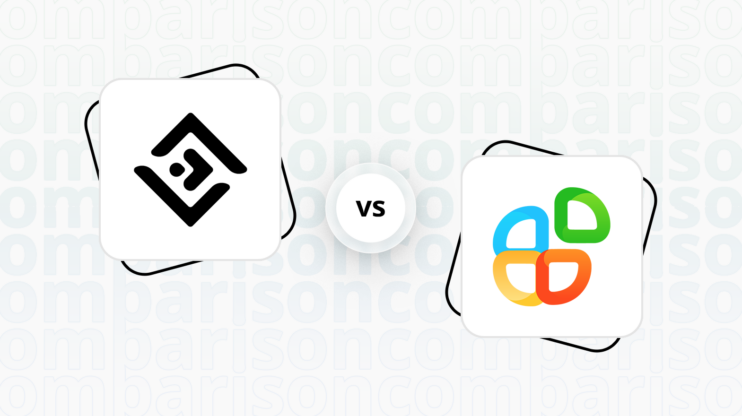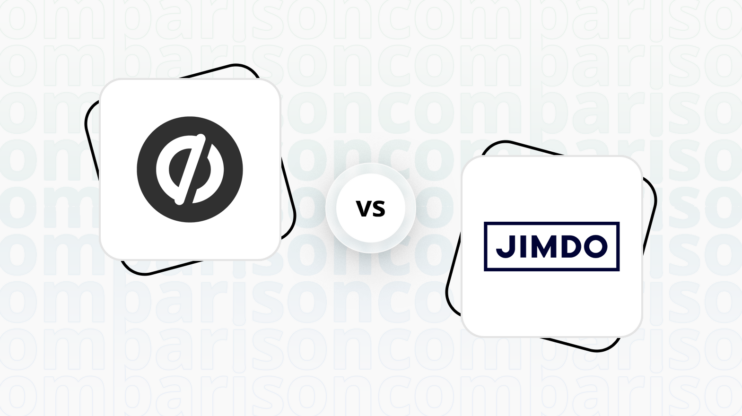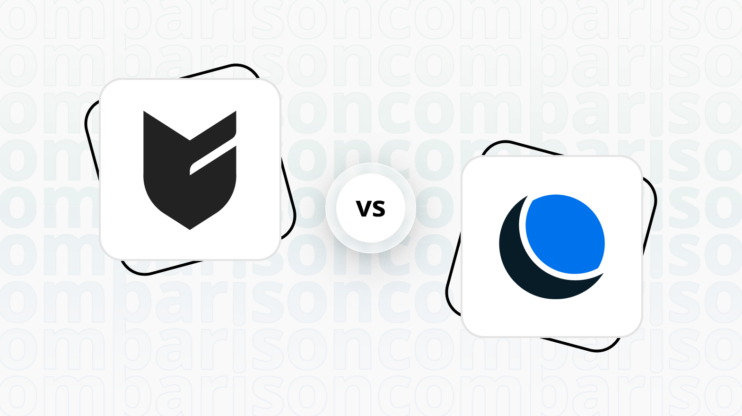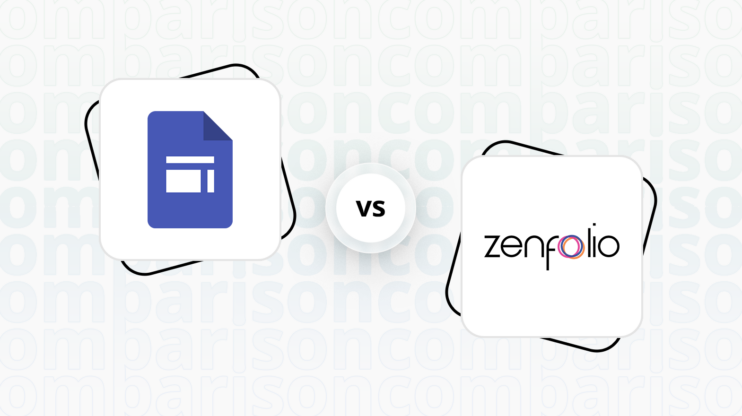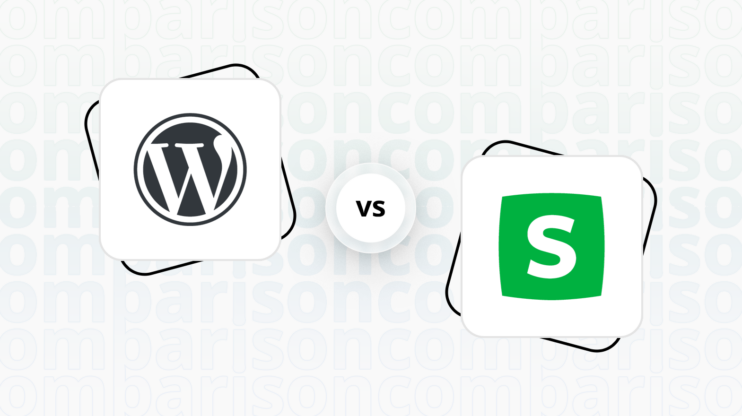Final verdict
Jimdo and Webnode both offer user-friendly website building experiences, but they cater to slightly different needs and preferences.
-
Jimdo (Overall Grade: 7.2/10)
excels in providing a simple and intuitive platform, making it ideal for beginners and small businesses. Its AI-driven website builder, Jimdo Dolphin, simplifies the design process, while Jimdo Creator offers more customization options. Jimdo stands out with its comprehensive marketing tools, strong security measures, and a wide range of plugins and integrations. When comparing Jimdo vs Webnode, Jimdo is the better choice for users seeking a straightforward, no-code website building experience with robust ecommerce capabilities. -
Webnode (Overall Grade: 6.5/10)
is a solid option for users looking to create a simple website quickly and easily. Its drag-and-drop interface and customizable templates make it accessible for beginners without coding experience. Webnode offers a variety of ecommerce features and multilingual support, catering to diverse audiences. However, it falls short in advanced functionalities and customer support compared to Jimdo. Considering Jimdo vs Webnode, Webnode is suitable for users who prioritize ease of use and affordability over advanced features and customization.

|

|
|
|---|---|---|
|
Design functionalities & templates |
7.2 |
7.1 |
|
Ease of use |
8.0 |
8.0 |
|
Ecommerce |
7.0 |
6.3 |
|
Website Editors |
7.8 |
7.3 |
|
Product testing options |
6.4 |
5.3 |
|
Price |
7.5 |
7.7 |
|
Hosting quality |
6.7 |
6.3 |
|
Website speed optimization |
7.6 |
6.1 |
|
Plugins and integrations |
7.4 |
6.8 |
|
Marketing features |
7.2 |
5.5 |
|
Customer support |
6.8 |
5.3 |
|
Security |
8.3 |
7.7 |
|
AI capabilities |
6.0 |
5.3 |
|
User Management |
5.8 |
6.9 |
Best for ecommerce
 7.0
7.0
 6.3
6.3
Verdict
: Jimdo is better suited for small businesses and entrepreneurs looking for simplicity and ease of use, while Webnode is ideal for individuals or small businesses needing basic ecommerce features.
-
Jimdo
: Jimdo’s ecommerce features are designed for simplicity and ease of use, making it a good choice for small businesses and entrepreneurs. It offers product details and variations, inventory tracking, no transaction fees, discount codes, and email marketing. However, when comparing Jimdo vs Webnode, Jimdo stands out with its more comprehensive marketing tools and user-friendly interface. -
Webnode
: Webnode provides basic ecommerce features suitable for individuals or small businesses looking to set up a simple online store. It includes shipping options, payment gateway integrations, order management, and coupons and discounts. While it offers extensive customization options for product pages, it may fall short in terms of advanced ecommerce functionalities compared to Jimdo.
Best for informational & business websites
 7.4
7.4
 7.2
7.2
Verdict
: Jimdo slightly outperforms Webnode for informational and business websites, thanks to its user-friendly design, comprehensive hosting, and robust security features.
-
Jimdo
: Jimdo is a versatile website builder that caters to a wide range of users, from personal blogs to small business websites. Its ease of use, combined with AI-driven tools and a variety of templates, makes it an excellent choice for creating professional-looking informational sites. Jimdo’s comprehensive hosting and strong security measures further enhance its appeal for business websites. With a score of 7.4, Jimdo stands out as a reliable option for those seeking simplicity and efficiency. -
Webnode
: Webnode offers a straightforward drag-and-drop interface, making it easy for beginners to create websites without any coding knowledge. While it provides a variety of customizable templates and responsive design capabilities, it falls slightly behind Jimdo in terms of hosting transparency and security features. Webnode is still a solid choice for creating simple informational websites quickly and easily, scoring 7.2 in this category. When comparing Jimdo vs Webnode, Webnode is suitable for users who prioritize ease of use and quick setup.
Detailed comparison
Design functionalities & templates
Design FunctionalitiesRepresents how well each platform allows for creative design and customization of websites.Score Components:
- Template Variety (30%): Range and quality of design templates.
- Customization (30%): Flexibility and options for design alterations.
- User Interface (20%): Ease and intuitiveness of the design process.
- Responsiveness (10%): Adaptability to different devices and screen sizes.
- Innovation (10%): Unique design features and tools.
 7.2
7.2
 7.1
7.1
🏆
Winner: Jimdo.
Although both platforms offer a variety of templates and design flexibility, Jimdo edges out Webnode with a slightly higher score.
Jimdo offers a diverse range of templates suitable for various industries and user preferences, with options to preview and select templates easily. The platform allows flexibility in changing templates for existing websites and also provides a “Blank Template” for custom designs, catering to both beginners and advanced users.


On the other hand, Webnode offers a variety of website templates designed for different purposes, from business and portfolios to restaurants and travel. These templates are customizable and responsive, ensuring they display well on any device. While an exact number isn’t available, Webnode provides a wide selection to cater to diverse website needs.
Get a head start on website creation with AI
Create a custom website tailored to your business needs 10X faster with 10Web AI Website Builder!
Ease of use
Ease of useReflects the platform’s overall user-friendliness.Score
Components:
- Learning curve (40%): Quickness and ease of getting started.
- Interface design (30%): Simplicity and intuitiveness of layout.
- User guidance (20%): Quality of tutorials and support.
- Flexibility (10%): Adaptability to various user skills.
 8.0
8.0
 8.0
8.0
🏆 Winner: Tie
. Both Jimdo and Webnode score an 8.0 in ease of use. Jimdo stands out with its AI-driven website builder, Jimdo Dolphin, which simplifies the design process, making it particularly user-friendly for beginners. Webnode, on the other hand, is praised for its straightforward interface and drag-and-drop functionality, making it suitable for beginners without coding experience.
Learning Resources
🏆 Winner: Jimdo
. While both platforms offer learning resources, Jimdo provides a ‘no-coding’ mode for easy, automated website creation, and a ‘coding expert’ mode for more control and advanced features, making it more accessible for a wide range of users. Webnode offers a variety of learning resources, but the quality and accessibility of these resources may vary.
For ecommerce
EcommerceMeasures the platform’s effectiveness in supporting online business activities.Score Components:
- Ecommerce themes and templates (20%): Variety and design of templates.
- Product management (25%): Ease of managing and organizing products.
- Payment options (25%): Variety and convenience of payment methods.
- Ecommerce features (20%): Features for managing an ecommerce store.
- Integration (10%): Compatibility with external e-commerce tools and services.
 7.0
7.0
 6.3
6.3
Jimdo and Webnode both offer ecommerce capabilities, but they cater to different needs. Jimdo’s ecommerce features are designed for simplicity and ease of use, making it a good choice for small businesses and entrepreneurs. Webnode, on the other hand, offers basic ecommerce features that may be suitable for individuals or small businesses looking to set up a simple online store.

|

|
|
|---|---|---|
|
Ecommerce themes and templates |
6.5 |
6.5 |
|
Product page customization |
6.8 |
7.0 |
|
Payment processing and commissions |
7.5 |
6.8 |
|
POS capabilities |
5.0 |
4.0 |
|
Payment gateways |
7.0 |
7.0 |
|
Product numbers |
6.0 |
5.5 |
|
Additional ecommerce features |
6.5 |
6.0 |
Jimdo ecommerce features:
- Product details and variations
- Inventory tracking
- No transaction fees
- Discount codes and promotions
- Email marketing
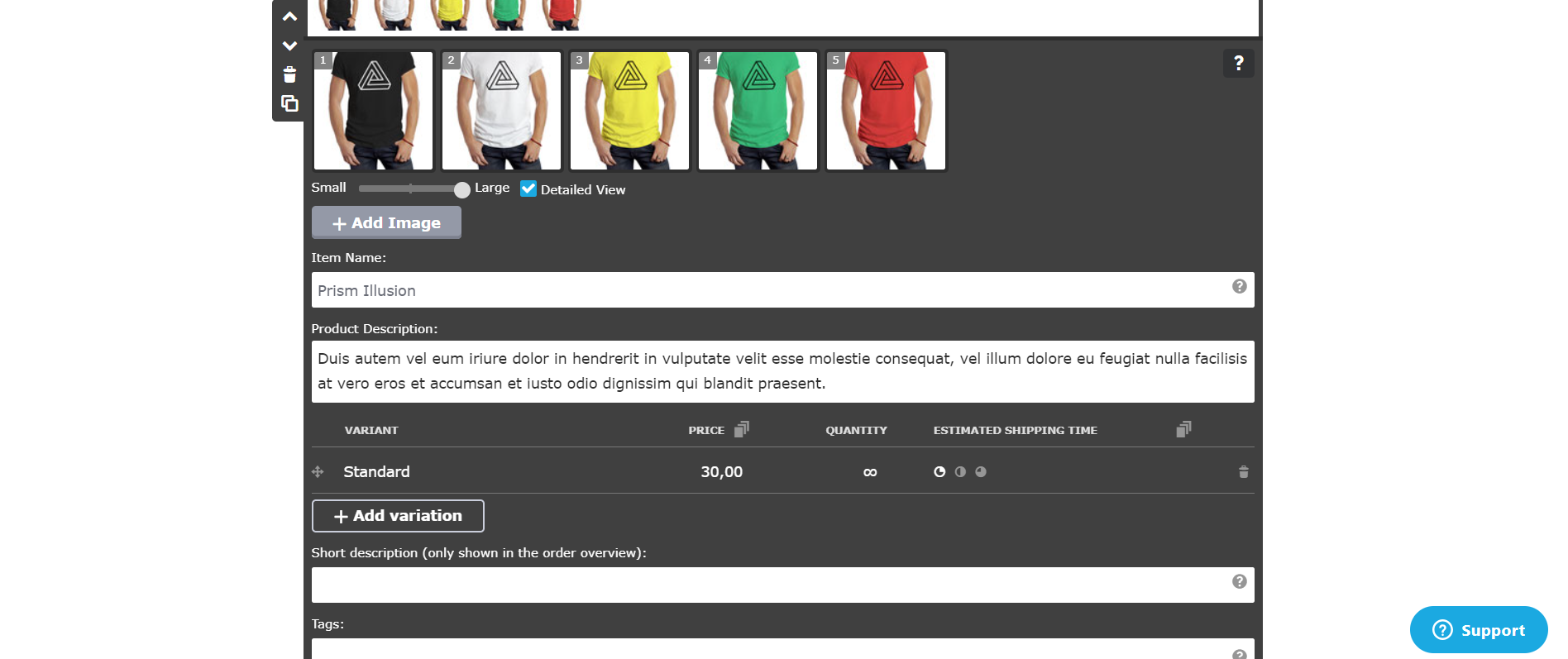
Webnode ecommerce features:
- Shipping options
- Payment gateway integrations
- Order management
- Coupons and discounts
Ecommerce themes & templates
Jimdo’s ecommerce templates offer a diverse range of pre-designed themes, ensuring a mobile-friendly and smooth shopping experience. The drag-and-drop interface allows for easy customization of colors, fonts, and layouts, while templates focus on showcasing products with dedicated sections for images, descriptions, and clear calls to action.
Webnode offers ecommerce-specific templates designed for creating online stores. These templates typically come with features such as product showcasing, shopping cart functionality, support for various payment gateways, and customization options. However, users should be mindful of potential limitations such as customization restrictions, feature limitations based on plan tiers, transaction fees, and integration limitations when choosing a template and plan for their ecommerce website on Webnode.
Product page customization
Customizing a product page on Jimdo involves using its user-friendly interface to personalize various elements. You can edit text, add images, adjust layouts, and modify design elements like colors and fonts to showcase your products effectively. Jimdo also offers additional features such as SEO tools and mobile responsiveness to ensure your product page performs well across different devices and search engines.
Webnode provides users with extensive customization options for product pages, allowing for the creation of visually appealing and informative displays. Through customizable content blocks, product images and galleries, and tailored product descriptions, users can effectively showcase their products. Additionally, features such as customizable call-to-action buttons, product variations, and SEO optimization contribute to a seamless and optimized shopping experience.
Payment processing
Jimdo facilitates payment processing through various popular gateways like PayPal, Stripe, Mollie, and more, depending on your location and plan. While Jimdo doesn’t impose transaction fees, individual payment gateways may have their own charges, typically ranging from 2% to 3% of the transaction amount plus a fixed fee.
Webnode supports various payment gateways, including popular options like PayPal and Stripe, for online transactions. While Webnode itself doesn’t charge commissions on transactions, payment gateways may have their own fee structures. Webnode primarily focuses on facilitating online transactions and doesn’t provide native POS capabilities, although integration with third-party POS solutions may be possible.
Website Editors
Website EditorsEvaluates the platforms’ website building and editing capabilities.Score Components:
- Customization tools (40%): Range and power of editing features.
- Editor usability (30%): User experience within the editor.
- Design flexibility (20%): Freedom in layout and design changes.
- Update and maintenance ease (10%): Simplicity of updating and maintaining the site.
 7.8
7.8
 7.3
7.3
🏆
Winner: Jimdo
. Jimdo, with a score of 7.8, offers two main modes: Jimdo Dolphin and Jimdo Creator. Dolphin, an AI-driven tool, is ideal for beginners and creates websites based on user responses to a series of questions, streamlining the web design process. On the other hand, Jimdo Creator provides a more traditional website building experience with greater customization options, including a drag-and-drop editor and HTML widgets, catering to users seeking more control over their site’s design.
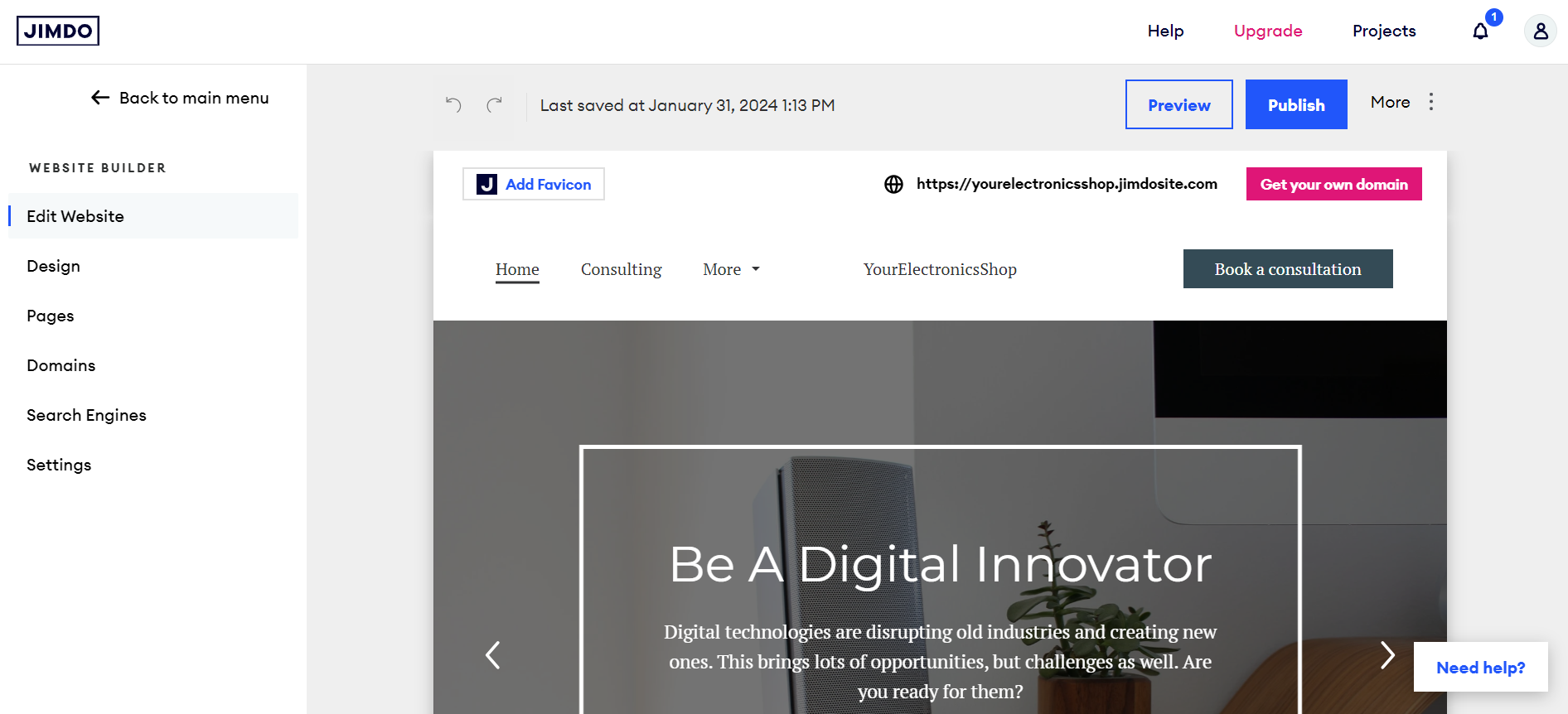
Webnode’s editor, scoring 7.3, features a user-friendly drag-and-drop interface with customizable templates, enabling users to easily create professional-looking websites without coding skills. The editor offers responsive design capabilities and multilingual support, catering to diverse audiences across different devices and languages. Built-in features such as SEO tools, e-commerce functionality, and analytics integration empower users to optimize their websites for search engines, sell products online, and track performance metrics effectively.
Mobile editor/app
 8.0
8.0
 5.5
5.5
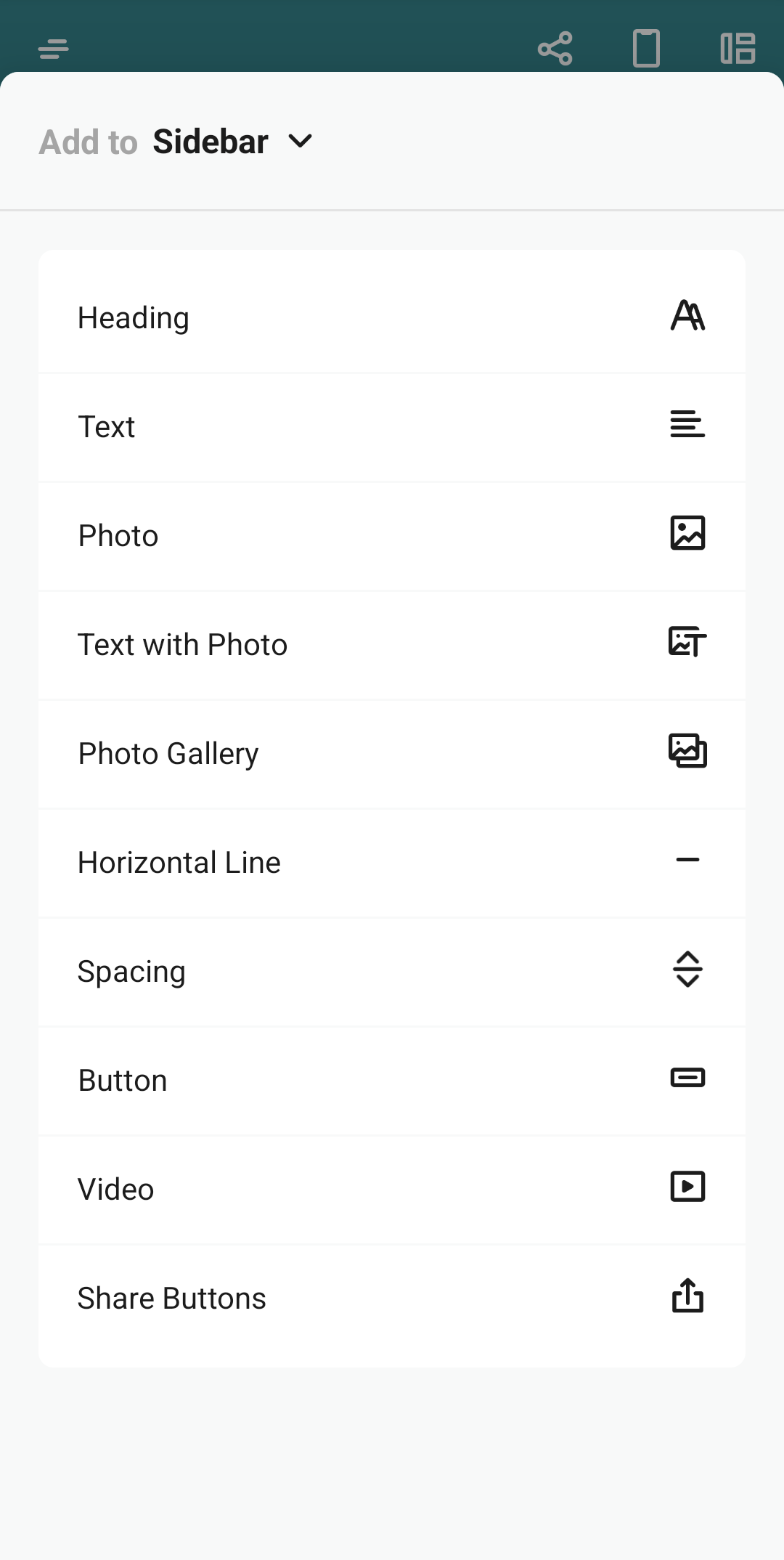

🏆
Winner: Jimdo
. Both Jimdo and Webnode offer mobile editing capabilities, but they differ in their approach and functionality. Jimdo provides a dedicated mobile app, allowing users to create and manage their websites directly from their smartphones or tablets. This app offers a convenient way to edit and update your site on the go, including adding or modifying content, adjusting design elements, and managing your online store.
On the other hand, Webnode does not have a dedicated mobile editor app. Users can edit their website using the mobile browser version of the editor, but it comes with certain limitations.
In summary, Jimdo offers a more comprehensive and user-friendly mobile editing experience, making it the winner in this category.
Product testing options
Product Testing OptionsAssesses the options for trying out platform features before commitment.Score Components:
- Trial quality (40%): Extent and usefulness of the trial or free version.
- Feature accessibility (30%): How many features are available to test.
- Trial duration (20%): Length of the trial period.
- Ease of transition (10%): Smoothness of moving from trial to paid plans.
 6.4
6.4
 5.3
5.3
Overall Result
:
Jimdo wins
. Jimdo scores 6.4, while Webnode scores 5.3 in product testing options. Jimdo offers a free plan and a 14-day money-back guarantee for all paid plans, allowing users to explore basic features and test more advanced options. Webnode also offers a free plan, but it doesn’t provide a trial version. However, it does offer a 15-day money-back guarantee.

|

|
|
|---|---|---|
|
Free Plan |
Yes | Yes |
|
Trial Duration |
No (14-day money-back guarantee) | No (15-day money-back guarantee) |
|
Testing Premium Features |
Yes, with paid plans |
Limited, with free plan |
Price
PriceLooks at the cost-effectiveness and value for money of each platform.Score Components:
- Plan value (40%): What each pricing tier offers.
- Transparency and clarity (30%): Clearness of pricing structures.
- Flexibility of plans (20%): Range of options to suit different budgets.
- Hidden costs (10%): Additional expenses not included in the plan.
 7.5
7.5
 7.7
7.7
Webnode and Jimdo have similar pricing structures, but Webnode offers slightly more value for money, especially for users who need more storage and email accounts.

|

|
|
|---|---|---|
|
Free |
Play ($0/month): Basic, entry-level plan offering limited features, ideal for testing Jimdo’s capabilities. Includes 500MB storage and up to 5 website pages. Limited ecommerce functionality. |
No offering at this amount. |
|
$0-$7 |
No offering at this amount. |
LIMITED ($5.50/month): Basic plan, 200 MB storage, attach domain, website statistics, up to 5 form fields, last 30 days backup. This plan allows to manage 1 website with unlimited number of pages. Value for price: 3.0 |
|
$7-$15 |
Start ($9/month): Aimed at small projects or businesses just starting out. Provides 5GB of storage and up to 10 website pages, along with SEO tools for online visibility. Not directly focused on ecommerce. Value for price: 6.0 |
MINI ($10.00/month): All essentials for a simple website, 1 GB storage, 3 GB bandwidth, website statistics, 1 email account. This plan allows to manage 1 website with unlimited number of pages. Value for price: 4.5 |
|
$10-$15 |
Grow ($15/month): Targets growing businesses needing more space and features. Offers more flexibility but still lacks dedicated ecommerce capabilities compared to the Business plan. Provides 20GB bandwidth with up to 50 website pages. Value for price: 7.0 Basic ($15/month): Up to five forwarding email addresses, up to 10 website pages, convenient payment methods. Value for price: 6.5 |
No offering at this amount. |
|
$15-$20 |
Grow ($15/month): Targets growing businesses needing more space and features. Offers more flexibility but still lacks dedicated ecommerce capabilities compared to the Business plan. Provides 20GB bandwidth with up to 50 website pages. Value for price: 7.0 Basic ($15/month): Up to five forwarding email addresses, up to 10 website pages, convenient payment methods. Value for price: 6.5 |
No offering at this amount. |
|
$20-$30 |
Business ($19/month): Designed for small to medium-sized online stores, offering ecommerce features without transaction fees. Includes selling on Facebook and Instagram, and various payment options. And up to 50 website pages. Value for price: 8.0 |
STANDARD ($16.90/month): For starting an online store, 3 GB storage, 10 GB bandwidth, 20 email accounts, basic store features. This plan allows to manage 1 website with unlimited number of pages. Value for price: 6.0 |
|
$30+ |
No offering at this amount. |
PROFI ($26.50/month): Professional websites, 7 GB storage, unlimited bandwidth, 100 email accounts, full online store capabilities. This plan allows to manage 1 website with unlimited number of pages. Value for Price: 7.5 |
location. As a result in rare cases the prices displayed here can differ from the ones you see on their
websites.
Hosting quality
Hosting
qualityExamines the reliability and performance of the hosting solutions.Score Components:
- Uptime (40%): Consistency and reliability of website availability.
- Speed (30%): Loading times and performance.
- Bandwidth and storage (20%): Sufficiency of resources provided.
- Data centers (10%): Quality and distribution of hosting infrastructure.
 6.7
6.7
 6.3
6.3
🏆
Winner: Jimdo
Both Jimdo and Webnode offer hosting services included in all their plans. However, Jimdo provides more transparency about its hosting type and data centers, which are distributed across multiple regions. Although both do not offer an uptime guarantee, Jimdo’s uptime is slightly lower than Webnode’s. Despite this, Jimdo’s transparency and comprehensive hosting options give it a slight edge over Webnode.

|

|
|
|---|---|---|
|
Do they offer hosting? |
Yes, included in all paid plans |
Yes, included in all paid plans |
|
Data Centers: |
Jimdo doesn’t publicly disclose the exact locations of its data centers, but they utilize a distributed network of highly secure and reliable facilities spread across multiple regions |
Webnode does not disclose the locations of its data centers |
|
Type of hosting: |
Shared Hosting, Cloud Hosting, Managed Hosting |
Webnode does not disclose its hosting type |
|
Uptime: |
99.5% |
99.6% |
|
Uptime Guarantee: |
No |
No |
Website Speed Optimization
Website Speed OptimizationEvaluates optimization of website loading timesScore Components:
- PageSpeed Score (30%): Google’s score indicating performance optimization.
- Loading Time (30%): The average time until a website is fully interactive.
- Mobile Optimization (15%): Optimization effectiveness for mobile devices.
- Resource Optimization (15%): Optimizing images, scripts, and other heavy resources.
- CDN Usage (10%): Use of CDN to enhance speed across geolocations.
 7.6
7.6
 6.1
6.1
🏆 Winner: Jimdo
Both Jimdo and Webnode have strategies in place for website speed optimization, but Jimdo takes the lead with a more comprehensive approach and a focus on Core Web Vital improvements.

|

|
|
|---|---|---|
|
Focus |
Content Optimization, CDN, Image optimization, Caching, Mobile Responsive design |
Code Minification, Image Optimization, Caching |
|
Performance Tools |
Google Lighthouse, PageSpeed Insights |
Google PageSpeed Insights |
|
Key Strategies |
Content Optimization, CDN, Image optimization, Caching, Mobile Responsive design |
Code Minification, Image Optimization, Caching |
|
Load Times |
Varies widely, dependent on optimization |
Varies depending on optimization |
|
Page Speed Scores Range |
Scores vary; influenced by plugins, images |
Varies depending on optimization |
|
Core Web Vitals Improvement |
Optimizing LCP, Enhancing FID, Improving CLS |
No information provided |
Jimdo’s approach to website speed optimization includes a variety of strategies such as content optimization, using a Content Delivery Network (CDN), image optimization, caching, and mobile responsive design. These strategies, combined with the use of performance tools like Google Lighthouse and PageSpeed Insights, help Jimdo websites achieve optimal load times and PageSpeed scores. Jimdo also places a strong emphasis on improving Core Web Vitals, specifically optimizing Largest Contentful Paint (LCP), enhancing First Input Delay (FID), and improving Cumulative Layout Shift (CLS).
On the other hand, Webnode’s approach to website speed optimization is more limited, focusing on code minification, image optimization, and caching. While these strategies can help improve website speed, Webnode does not provide any information on their Core Web Vitals improvements, which could be a potential area of concern for users prioritizing website performance. The load times and PageSpeed scores for Webnode websites vary depending on optimization.
Get a head start on website creation with AI
Create a custom website tailored to your business needs 10X faster with 10Web AI Website Builder!
Plugins and integrations
Plugins and integrationsMeasures the range and effectiveness of additional plugins and integrations.Score Components:
- Variety of options (40%): Range of available add-ons.
- Integration smoothness (30%): Ease of integrating plugins into the site.
- Quality of plugins (20%): Functionality and reliability of the options.
- Custom integration capabilities (10%): Support for custom or third-party integrations.
 7.4
7.4
 6.8
6.8
🏆 Winner: Jimdo.
With a score of 7.4, Jimdo offers a range of plugins and extensions, with POWr and Elfsight being major providers. These tools enhance website functionality and cater to diverse business and marketing needs. Webnode, scoring 6.8, also supports a variety of plugins/integrations developed by Elfsight, aiming to enhance website functionality, improve user engagement, and drive conversions. However, Jimdo’s offerings are more comprehensive, making it the winner in this category.

Marketing Features
Design FunctionalitiesRepresents how well each platform allows for creative design and customization of websites.Score Components:
- Template Variety (30%): Range and quality of design templates.
- Customization (30%): Flexibility and options for design alterations.
- User Interface (20%): Ease and intuitiveness of the design process.
- Responsiveness (10%): Adaptability to different devices and screen sizes.
- Innovation (10%): Unique design features and tools.
 7.2
7.2
 5.5
5.5
🏆
Overall Winner: Jimdo
. Jimdo stands out for its more comprehensive marketing tools, especially in SEO and email marketing. Webnode, while offering a range of marketing features, lacks a dedicated email marketing tool and relies on external integrations for analytics.

|

|
|
|---|---|---|
|
SEO Tools |
|
|
|
Email Marketing |
|
|
|
Blogging |
|
|
|
Social Media Integration |
Integration features for various social media platforms |
Yes, through third party integration |
|
Analytics and Reporting |
Integrated analytics for monitoring website traffic |
Yes |
|
Ads and Promotions |
Tools and features for promotions |
Yes |
Customer Support
Customer supportEvaluates the quality and availability of support options.Score Components:
- Response time (40%): Speed of support responses.
- Support quality (30%): Effectiveness and helpfulness of the support.
- Availability (20%): Range of support channels (phone, chat, email).
- Resource richness (10%): Quality of self-help and educational materials.
 6.8
6.8
 5.3
5.3
🏆 Winner: Jimdo
. In the Jimdo vs Webnode comparison, Jimdo takes the lead with a customer support score of 6.8. Jimdo offers various support channels, including email, a call center, a knowledge base, and social media support. Although it lacks live chat support, the availability of multiple support options makes it easier for users to find help when needed.
Webnode, with a customer support score of 5.3, provides support in over 20 languages and aims to resolve inquiries within 24 hours. However, its support is primarily through email, with priority phone support available only to premium customers. The lack of live chat and limited availability of phone support may be a drawback for users seeking immediate assistance.
Security
SecurityLooks at the platforms’ security measures and data protection.Score Components:
- Data protection (40%): Safeguards for user and customer data.
- SSL and encryption (30%): Implementation of secure connections.
- Compliance (20%): Adherence to industry security standards.
- Regular updates (10%): Frequency of security updates and patches.
 8.3
8.3
 7.7
7.7
🏆
Winner: Jimdo
. Jimdo’s security measures are comprehensive, with a strong focus on data protection and GDPR compliance. They use AI for personalization without data training, employ IT security measures, and anonymize web analytics data. Their website security includes a strong firewall, DDoS protection, HTTPS encryption for all traffic, TLS encryption for messages and emails, and SSL certificates for domains.
Webnode also offers a variety of security measures, including a Premium Site Security add-on with IP Filters, Form Protection, and Malware Scanning for users with a Premium Plan. All Webnode sites are automatically secured with HTTPS, ensuring safe browsing for visitors. However, compared to Jimdo, Webnode’s security measures are not as comprehensive, making Jimdo the winner in this category.
AI Capabilities
AI capabilitiesMeasures the effectiveness of AI-driven features and tools.Score Components:
- Automation efficiency (40%): Impact of AI on streamlining processes.
- Personalization (30%): AI-driven customization for users or customers.
- AI-Assisted design (20%): Role of AI in website design and functionality.
- Data analysis (10%): Use of AI in interpreting user data and analytics.
 6.0
6.0
 5.3
5.3

|

|
|
|---|---|---|
|
Personalized Design |
AI-powered design suggestions for store layouts and images |
|
|
SEO Optimization |
|
|
|
Customer Behavior Analysis |
|
|
|
Sales Predictions |
|
|
|
Inventory Management |
Basic inventory management insights |
|
|
Content Generation |
|
|
🏆 Winner: Jimdo
. Jimdo, with a score of 6.0, utilizes AI mainly to enhance the design process of its ecommerce features. Its AI capabilities, while basic, provide design suggestions for store layouts and image recommendations.

Webnode, scoring 5.3, does not have any AI ecommerce features or AI content generation features. Its AI capabilities are limited to its AI-assisted builder, which guides users through the website creation process.
User Management
User ManagementAssesses the platforms’ capabilities in managing user roles, permissions, and accessibility.Score Components:
- Role Customization (40%): Flexibility in creating and defining user roles and
permissions. - Ease of Management (30%): User interface and tools for managing users.
- Access Control (20%): Effectiveness of access control measures for different user
levels. - Scalability (10%): Ability to manage a growing number of users efficiently.
 5.8
5.8
 6.9
6.9
🏆 Winner: Webnode
. Both Jimdo and Webnode offer different levels of user management, but Webnode provides more flexibility with user roles and permissions.
- Jimdo’s Free, Start, and Basic Shop Plans allow website management by a single owner. The Grow Shop Plan permits two editors, including the account owner and one collaborator. The Business Plan extends collaboration to five editors, consisting of the account owner and four collaborators. The Unlimited Plan provides unlimited editors, fostering a collaborative team environment. The VIP Plan, designed for online stores, does not specify a limit on editors for websites.
- Webnode allows multiple users to manage and edit a website, but the exact number vary depending on the subscription plan you choose. Generally, the free version of Webnode provides limited user access for management and editing, while premium plans offer more flexibility, including the ability to add multiple users with different roles and permissions.
Webnode User Roles and Access Levels:
| Role | Description | Access Highlights |
|---|---|---|
| Website Owner | The individual or entity that owns the Webnode website. | Full access: can modify site structure, design, content, and manage user roles. |
| Administrator | Users with administrative privileges assigned by the website owner. | Nearly full access, including content management, and some settings adjustments. |
| Editor | Users tasked with creating, editing, and publishing content. | Access to add and edit content, blog posts, and pages, but cannot alter design. |
| Contributor | Users who can contribute content but cannot publish it. | Can draft content but need approval from an Editor or Administrator to publish. |
| Viewer/Visitor | Individuals who visit the website without any editing permissions. | Can view the public website and interact through comments or contact forms. |
| E-commerce Manager | Specifically for websites with an e-commerce component, managing products. | Can add, edit, and manage products, orders, and customer interactions. |
Additional Features

|

|
|
|---|---|---|
|
SSL Certificate |
|
|
|
Custom Domain |
|
|
|
Free Custom Domain Included |
|
|
|
International Domains |
|
|
|
Mobile Responsive |
|
|
|
Page Speed |
|
|
|
Website Builder Mobile App |
|
|
|
Convert a Website To An App |
|
|
|
Website Analytics |
|
|
|
Multilingual Sites |
|
|
|
Multiple Users |
|
|
User Feedback
Jimdo, a website builder platform, receives mixed reviews from users. Positive feedback highlights its ease of use, no-code editor, and quick website development for basic sites. However, criticisms include outdated design, limited templates, and concerns about pricing transparency. Some users appreciate it for simple projects, while others find it lacking for more complex websites. Common issues include restricted SEO in the free tier, support limitations, and late responses. The overall impression suggests Jimdo may suit beginners but could be less ideal for those seeking advanced features or modern designs.
User feedback on Webnode highlights its ease of use, rapid website creation capabilities, and the wide range of templates available, making it a popular choice for individuals and businesses seeking an intuitive web development platform. While praised for its user-friendly interface and quick setup, including domain purchase and application, some users express a desire for more flexibility and customization options, especially in themes and e-commerce features. Comparatively, it falls short on advanced functionalities such as SEO tools and widgets offered by competitors like WordPress. Customer service experiences vary, with some users facing challenges in getting support for email hosting and analytics integration. Overall, Webnode is celebrated for its ability to accommodate users with little to no coding knowledge, offering an accessible solution for creating professional websites, though it may not fully meet the needs of those requiring more complex site features or dedicated customer support.
The making of this blog
We followed a clear, step-by-step process to write and research this article.
FAQ
Which platform is easier to use, Jimdo or Webnode?
Can I create an ecommerce website with Jimdo or Webnode?
Which platform offers better customer support, Jimdo or Webnode?
How do Jimdo and Webnode compare in terms of website speed and optimization?
Which platform is more secure, Jimdo or Webnode?
Are there any differences in the pricing plans of Jimdo and Webnode?
Which platform is better for creating multilingual websites?
Can I manage my website on the go with either Jimdo or Webnode?
How do the design and template options compare between Jimdo and Webnode?
Which platform is recommended for users with no coding experience?











